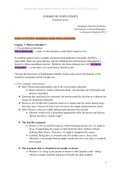Summary
Summary IBCOM YEAR III - Communication Ethics (CM3010)
- Course
- Institution
- Book
Summary of all the compulsory content (week 1-8) of the course Communication Ethics (CM3010) of the International Bachelor of Communication and Media - 3rd year. Main literature consist of chapters 1,2, 6-11 of the book: 'Elements of Moral Philosophy', by Rachels & Rachels, 2012 (7th edition). ...
[Show more]




